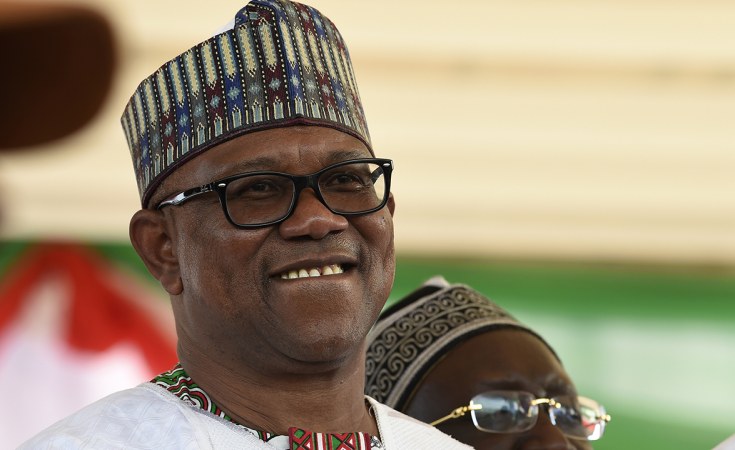In the latest poll, 21 per cent of participants said they've decided to vote Mr Obi of the Labour Party over 13 per cent proposing to vote Bola Tinubu of the ruling All Progressives Congress and 10 per cent in favour of Atiku Abubakar of the main opposition Peoples Democratic Party.
Former governor of Anambra State Peter Obi has again emerged as the preferred choice to become the Nigeria's next president, according to an opinion poll, the third in the past week showing the Labour Party candidate is the top candidate.
In the survey commissioned by ANAP Foundation and conducted by NOI Polls Limited (NOIPolls), respondents identified Mr Obi as their favourite to succeed President Muhammadu Buhari through the election scheduled for 25 February.
The foundation published two polls last September and December showing the Labour Party candidate as the most favourable candidate.
In the latest poll, 21 per cent of participants said they have decided to vote Mr Obi of the Labour Party over 13 per cent who said they would vote Bola Tinubu of the ruling All Progressives Congress, and 10 per cent in favour of Atiku Abubakar of the main opposition Peoples Democratic Party.
Like the previous polls, Rabiu Kwankwaso of the New Nigeria's People Party is a "lone outsider" trailing with 3 per cent.
A total of 53 per cent of respondents were either undecided or refused to answer, according to a statement by ANAP on Wednesday. Mr Obi's 8 per cent lead is "significant but not sufficient to separate him from" the pack, ANAP said.
The organisation said 2,000 people participated in its recent survey that was concluded this month.
Last week, the Labour Party candidate was identified as the preferred president by almost 53 per cent of participants in Kwakol's 1,008-person survey that was released on 13 February. Messrs Tinubu and Abubakar both tallied less than 20 per cent.
Mr Obi's campaign has generated a momentum that many people didn't expect. However, the ruling party and main opposition PDP insist that he cannot triumph on 25 February. Mr Kwankwaso of the NNPP also said Mr Obi's supporters are only on social media and that his appeal is too thinly spread across the country's states to give him victory.
ANAP's poll said the gender split of undecided voters shows that 27 per cent of women are undecided versus 18 per cent of male registered voters.
The percentage of registered voters and/or voters with their Permanent Voter's Card (PVC) is as follows in each of the zones - 96 per cent in the North East, 93 per cent in the North West and South East respectively.
Slightly lower voter registration percentages were recorded in the North Central with 92 per cent, South West with 89 per cent and the South South with 88 per cent, the survey said.
Also, maximum voter participation across the 6 Geopolitical Zones, now range within a narrow band of 88-96 per cent.
Meanwhile, nine per cent of respondents said religion would affect the choice of candidates while 87 per cent responded that their choices were not being influenced by religion. In the same vein, seven per cent responded in the affirmative to ethnicity affecting their choice of candidates while 89 per cent responded that their choices were not influenced by ethnicity.
The data summarises the top five reasons why voters are more inclined to vote in the forthcoming elections, as follows: the need to tackle insecurity (36 per cent ); inflation (26 per cent); unemployment (11 per cent); poverty alleviation (6 per cent); and Education (5 per cent).
Several people have criticised the methodology deployed in conducting the polls but ANAP said the methodology used by NOIPolls is almost the exact same methodology that was used in previous presidential polls that they handled in 2011, 2015 and 2019.
"In all those past Presidential Polls, the front-runner that was identified by our Polls ended up winning the elections, irrespective of a rather large percentage of voters who were undecided and/or Refused to indicate who their preferred candidate was," ANAP said.
The roundation concluded that their method has been "tried and tested" since 2011. They, however, conceded that the 2023 presidential elections "are too close to call."
"Mr Peter Obi has been the front-runner throughout, but we caution that the Undecided/Refused vote is still too high (in early February 2023) to be ignored. We had thought that by delaying our 3rd and Final Poll until early February 2023 we would see a collapse of the Undecided Vote.
"The reality is that the reduction in the Undecided Vote has been more than offset by the increase in the number of voters who refuse to disclose the name of their preferred candidate."


